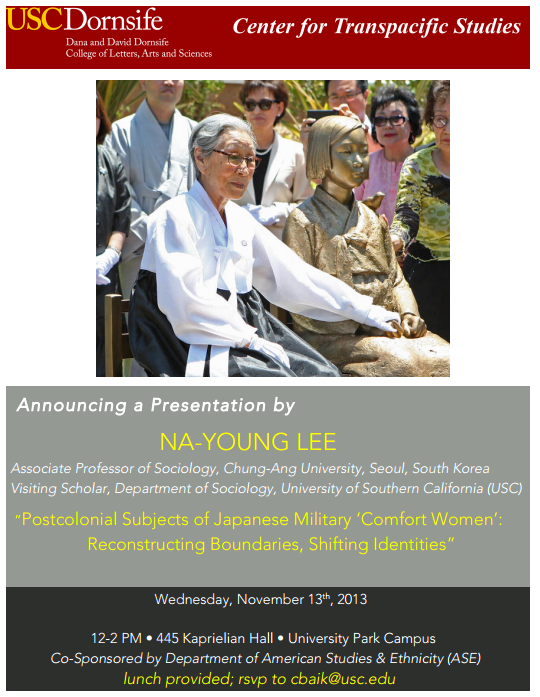November 13th, 2013 – Postcolonial Subjects of Japanese Military ‘Comfort Women’: Reconstructing Boundaries, Shifting Identities, presented by Na-Young Lee (USC)
 In this talk, Na-Young Lee explores the ways in which Japanese military “comfort women” have changed and reconstructed their identities, especially in relationship to the historical trajectory of the Korean women’s movement, as well as women’s testimonies. Lee argues that women, who suffered both from the Japanese military sexual slave system during Japanese colonization in Korea and from Korean patriarchy system that has continued post-liberation, have transformed their own identities from victims to transnational activists, and from hidden ghosts to historical subjects. Within the past twenty or so years, women have been actively engaged in movements against imperialism, colonialism, militarism, and patriarchy across national boundaries. Particularly, by focusing on the weekly “Wednesday Demonstration” in front of Seoul’s Japanese embassy, and through the formation of the Butterfly Fund (led by former Japanese “comfort” women), Lee describes “grandma” (halmoni in Korean), not as a helpless victim, but as a symbol of peace and women’s rights across time and space. Produced, in-part, with generous support from the USC Department of American Studies & Ethnicity (ASE).
In this talk, Na-Young Lee explores the ways in which Japanese military “comfort women” have changed and reconstructed their identities, especially in relationship to the historical trajectory of the Korean women’s movement, as well as women’s testimonies. Lee argues that women, who suffered both from the Japanese military sexual slave system during Japanese colonization in Korea and from Korean patriarchy system that has continued post-liberation, have transformed their own identities from victims to transnational activists, and from hidden ghosts to historical subjects. Within the past twenty or so years, women have been actively engaged in movements against imperialism, colonialism, militarism, and patriarchy across national boundaries. Particularly, by focusing on the weekly “Wednesday Demonstration” in front of Seoul’s Japanese embassy, and through the formation of the Butterfly Fund (led by former Japanese “comfort” women), Lee describes “grandma” (halmoni in Korean), not as a helpless victim, but as a symbol of peace and women’s rights across time and space. Produced, in-part, with generous support from the USC Department of American Studies & Ethnicity (ASE).
Na-Young Lee is Associate Professor of Sociology at Chung-Ang University in Seoul, and a Visiting Scholar of the Department of Sociology at the University of Southern California (USC). Since graduating from the Department of Women’s Studies at the University of Maryland in 2006 with dissertation titled “Construction of U.S. Camptown Prostitution: Empire, Nation, and Resistance,” she has developed wide ranging research interests, such as politics of representation, political economy of globalization, post/colonialism, gendered nationalism, sexuality, and women’s cross-national movements.
Lee has published many books and articles in Korean and English, covering subjects, such as “comfort women,” U.S. military bases, prostitution, gendered space, women’s oral history, and migration. In addition, as an active participant in the field of Japanese military sexual slavery, and the anti-prostitution and anti-US military prostitution movements, she has served on the boards of various professional associations for Women’s Studies, Sociology, and Cultural Studies in Korea.
Her publications include Feminist Oral History: Deconstructing Institutional Knowledge (co-editor) (2012), Post/Modern Asia and Women (co-author) (2011); “Listening Experiences of Military Prostitute: Anxiety of Post/Colonality and Im/Possibility of Ethical Representation,” (2011); “Women’s Movement for/on ‘Comfort Women’: Historical Present in the Context of Postcolonial Nation-State.” (2010); “Radical Feminism and Sexuality: Theorizing History and Sexuality.” (2009); and “The Construction of Military Prostitution in South Korea during the U.S. Military Rule, 1945-1948.” (2007).